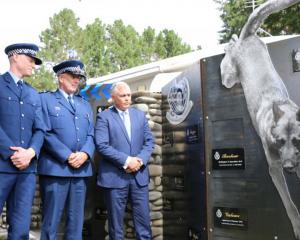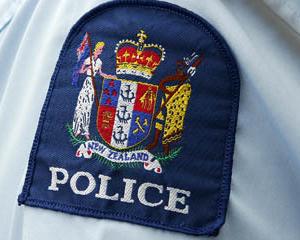Armed Offenders Squad members used stun grenades to gain entry to the Mongrel Mob Aotearoa gang headquarters at 250 Middleton Rd, Corstorphine, shortly after 7.30am yesterday, after the issuing of warrants for illegal drugs and property.
The two gang members inside the house offered no resistance, and one was arrested on drugs charges, Detective Inspector Steve McGregor said.
At the property, police seized two air rifles, an imitation pistol and a baseball bat with nails through it.
The former state house was seized on behalf of the Crown under the Criminal Proceeds (Recovery) Act 2009, the first such seizure in the southern region and only the second in New Zealand, Det Insp McGregor said.
The raid brought the final phase of Operation Rocket to a close, resulting in the arrest of 11 Mongrel Mob members and associates on Wednesday, and a further seven members and associates on Thursday.
All the charges related to illegal drugs, he said.
Det Insp McGregor said the Dunedin chapter had been dealt a major blow and police would be working hard to ensure no other organised gang filled the void.
"Their ability to recruit and retain members has been dealt a blow ... if you remove the leadership, where do they turn?"
Targeting organised crime gangs and their drug operations was a major focus for the Southern District, as "cannabis has been a significant part of their illegal business activity, and our objective is to deal to that", he said.
The culmination of Operation Rocket coincided with a "relatively quiet" period as far as other Dunedin gangs were concerned, and the high-profile seizure of the gang house would cause concern among their members, he said.
Det Insp McGregor said enhancements to the Criminal Proceeds (Recovery) Act, which came into force in December last year, enabled police to attack the heart of organised crime.
As of last month, police had identified more than $36 million worth of assets believed to have been obtained through criminal activity - of which $25 million was from drug offending.
The new legislation allows for the proceeds of crime to be forfeited to the Crown based on the civil standard of proof (balance of probabilities) rather than being solely dependent on securing a criminal conviction.
Court cases would decide whether the assets would be forfeited to the Crown.
Police Minister Judith Collins told the Otago Daily Times from Turkey last night, the Government had kept its promise and given police tougher legislative powers "to make life as difficult as possible for criminal gangs".
Ms Collins said she was sure the residents of Corstorphine would be pleased the gang house was now in the hands of the Crown.
"With the gang gone they may find their neighbourhood is a better and safer place to live."









